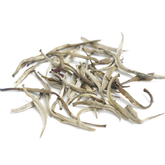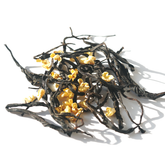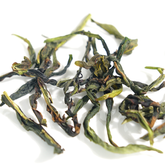Does green tea stain your teeth?|NPTEA
Drinking tea has become a daily habit for many people. In China, tea is consumed both before and after meals because it’s considered the best natural beverage besides water. However, as more people enjoy tea, they begin to wonder: Does drinking tea cause your teeth to turn yellow? Read the blog below, where we’ll analyze this common concern in more detail.

Does green tea stain your teeth?
Yes, drinking tea can stain your teeth. Many beverages, including tea and even orange juice, are harmful to tooth enamel. Studies have shown that certain herbal teas are acidic enough to erode enamel. The polyphenols in tea oxidize and attach to the surface of your teeth, causing discoloration, especially in hidden areas like between the teeth. Over time, this creates tea stains, or “tea plaque,” particularly if you don’t maintain good oral hygiene.
If you don’t brush your teeth after drinking tea, it can indeed lead to yellowing of the teeth. The more concentrated the tea, especially if you smoke, the faster this discoloration occurs. However, if you maintain good brushing habits, drinking tea won't have a major effect on your teeth.
How to Remove Tea Stains from Teeth
Professional Cleaning: The most effective way to remove tea stains is by visiting a dentist for professional teeth cleaning. Modern ultrasonic technology can remove tea stains, plaque, and discoloration, leaving your teeth white and clean.
Home Remedies: You can also reduce tea stains by brushing your teeth with salt daily. Additionally, after brushing, use a cloth with lemon juice to rub your teeth, which helps brighten and clean them.

Benefits of Tea for Teeth and Oral Health
Cavity Prevention.Tea is not all bad for your teeth. In fact, it has several oral health benefits. Tea contains components that can tighten gums, stop bleeding, kill bacteria, and neutralize acids from food. Some research has even found that tea can accelerate the healing of mouth ulcers, making it effective in preventing recurrent sores.
Preventing Tooth Sensitivity.Tea can also help with tooth sensitivity, reducing discomfort when exposed to cold, hot, sour, or sweet substances.
Reducing Bad Breath.Drinking tea, especially green and oolong teas, can reduce bad breath. These teas are rich in polyphenols like catechins, which have antibacterial and antioxidant properties. These compounds help control the bacteria that cause bad breath and reduce sulfur compounds, the main cause of halitosis.
Conclusion
Yes, drinking tea can stain your teeth, but with good oral hygiene, the impact is minimal. Make sure to rinse your mouth with water after drinking tea and brush your teeth regularly. At the same time, tea has many benefits for your oral health, such as preventing cavities and reducing bad breath. To learn more about the impact of tea on your teeth and oral health, explore the rest of our blog.
SEE MORE
If you have questions about selecting tea:
Learn-more-about-chinese-tea
If you have questions about the benefits of tea:
Health-benefits-of-chinese-tea
If you have questions about brewing tea:
How-to-brew-loose-leaf-tea






